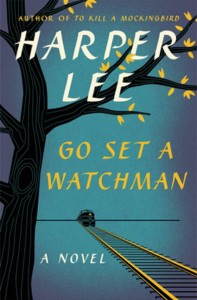July 23, 2015
Who Watches the Go Set a Watchman Watchmen?
by Andrew Karpan
The pretty machines of literary analysis have always been somewhat stymied in throughly juicing Harper Lee’s beloved popularity by the lack of numerical prolificness her bibliography has offered us so far. One is the loneliest number, after all. Well, all that certainly changed (and is set to soon do so again and again). And while we wait for Lee to hopefully witness a future as the literary world’s still-breathing Jimi, Kurt, or Tupac, the results are pattering on in!
Early to the starting line is a ridiculous piece of pseudo-academia coming in from Poland, titled “Go Set A Watchman While We Kill the Mockingbird In Cold Blood.” The study aims to breath some fresh dust into an old rumor that Lee’s good friend Truman Capote was behind some of Mockingbird—a rumor that Wikipedia, for one, traces to the observation that Capote blurbed the first edition of Mockingbird, which suggests that the authorship of every novel published in America over the last century should be questioned.
Not having the time to purse through the actual book (who has the time for that?), professors Maciej Eder and Jan Rybicki used computerized text-analysis algorithms to compare Lee’s use of certain function words (“the”, “a”, “he”, “she”, etc.) in Mockingbird and Watchman. As such, the researchers assigned certain sets of word patterns to suggest Harper Lee’s stylistics and another to suggest Truman Capote’s. The alarming result: “Harper Lee” mostly sounds like Harper Lee as much as “Truman Capote” mostly sounds like Truman Capote.
The headline-worthy contentions tagged to this study, however, come from a lone chapter of Mockingbird that was, however, flagged by researchers as a teensy bit Capote-ish. Where for most, this would neatly slide into a self-acknowledged margin of error, Eder and Rybicki instead peevishly leave it in, concluding that “claims about Capote’s alleged contribution to the Mockingbird are (mostly) unfounded.”
Of course, slippery rumors of authorship are about as fun and dramatic as anything else that’s been violently regurgitated into a blockbuster Roland Emmerich movie, so this is big news. This weekend’s Wall Street Journal dedicated a page to definitely reveal, from this study, that “[Lee’s] style as a writer was more consistent in Watchman than Mockingbird.” The article goes on to quote Eder’s own speculations as to how these inconsistencies in her more well-known novel could be narratively explained:
“Either she was rewriting many, many times, struggling with the style or overwhelming her own style again and again so that her natural voice would disappear or be less noticeable—or the other possibility is that she was helped by someone else in terms of being deeply inspired by someone or something, or copy edited by someone […] We have no clue which is the most probable.”
No clue indeed. A few anecdotes of Lee’s back and forth with her editor, Tay Hohoff ambiguously follow and the overall nudge is for us to hop on over to the Journal’s News Corp pals at HarperCollins and shell out for the deep, dark truth ourselves.
On the other side of the ocean, the Guardian quickly hit back at some of the overt cultural sexism going on here: “Why is it only women who are ever accused of not writing their own books?” Capote, after all, is rarely doubted as the sole author of In Cold Blood despite Lee’s near constant presence during his research in Holcomb, Kansas. Naturally, Catherine Keener’s Harper Lee seemed to conveniently back off when Phillip Seymour Hoffman’s Capote had to do his solo hardcore brooding in a certain 2005 movie that was not titled Capote & Lee: Research Buddies. Which altogether brings up the Guardian’s bigger point: “If collaboration were a disqualifier for authorship, there is an entire canon of literary masterpieces we may have to reconsider” — citing the well known authorial-editorial collaboration behind acclaimed works like Joseph Heller’s Catch-22.
But where’s the struggling genius blockbuster value in that?
